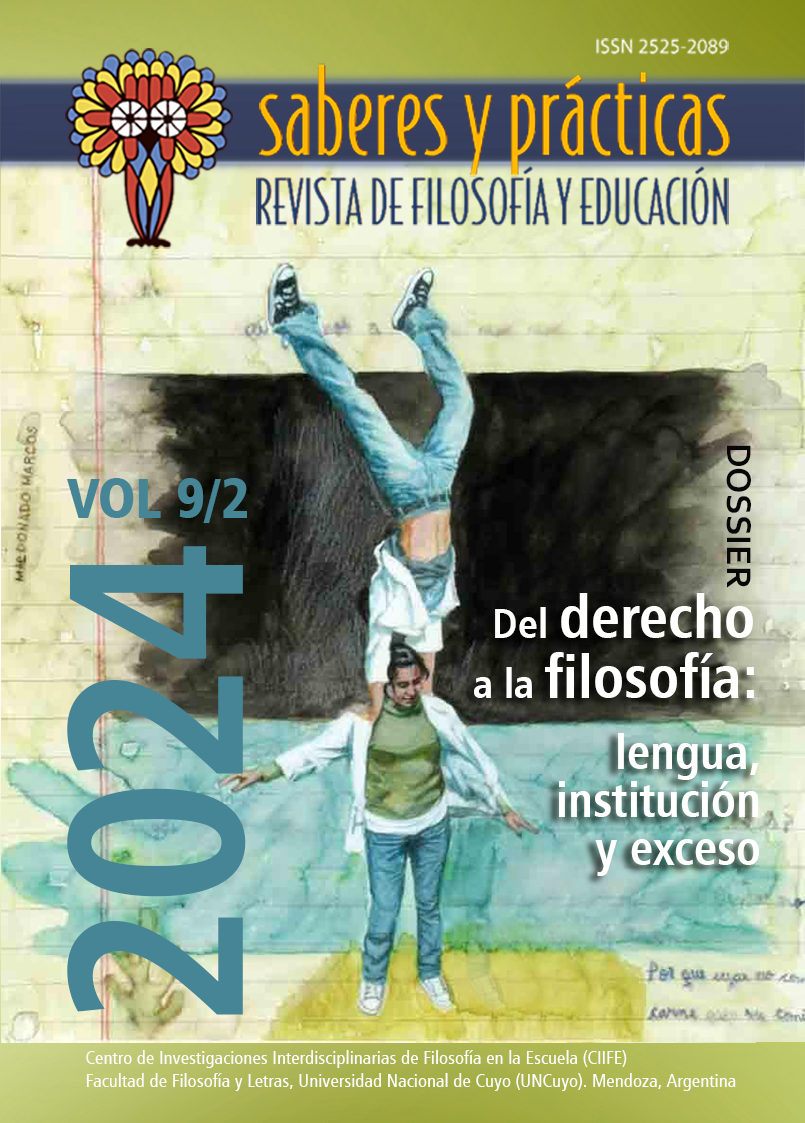Poiética de la lengua y democracia epistémica en prácticas poéticas de la escritura en Sudamérica
DOI:
https://doi.org/10.48162/rev.36.131Palavras-chave:
Derecho a la filosofía, Poi´ética de la lengua, Democracia epistémica, Matriz afectiva, Prácticas poéticasResumo
Algunas formas del pensamiento poético sudamericano revelan que las prácticas poéticas pueden realizarse por cualquiera sin técnica, lo que para nosotros muestra una potencia democrática. En primer lugar, distinguiremos las prácticas poéticas de las prácticas artísticas a través de un elemento ético afectivo para describir dicho proceso de montaje sígnico según nuestro modelo poiético de lo dado a sentir que vincula los conceptos de ethos y poiesis en una actividad de composición etológica hospitalaria que respondería a la ley del conatus spinoziano, generando lo que denominamos matriz afectiva, donde la capacidad afectiva de la actividad poiética de la lengua aplicada en su mantención revela su potencial de configuración epistémica y formas de vivir. Mostraremos que es posible encontrar ejemplos que se acoplan a este modelo en poéticas chilenas y mostraremos tres ejemplos de prácticas poéticas latinoamericanas de la escritura que problematizan sentidos en su dualidad sensible y significante, excediendo la lengua filosófica. Lo que nos permitirá mostrar lo que queremos anunciar con el concepto de democracia epistémica. Finalmente, a partir del problema del privilegio de la lengua filosófica que expone Jacques Derrida en el texto Privilegio o del Derecho a la Filosofía (2023), queremos mostrar la posibilidad de esta práctica de la lengua como actividad del pensamiento que se dirige a y excede la filosofía.
Downloads
Referências
Aranda, N. (2019). El poema como huella en Ximena Rivera. Ediciones Inubicalistas.
Arfuch, L. (2016). El “giro afectivo”. Emociones, subjetividad y política. deSignis, 24, 245-254. Federación Latinoamericana de Semiótica. https://www.redalyc.org/pdf/6060/606066848013.pdf
Badiou, A. (2003). El ser y el acontecimiento. Editorial Manantial.
Claro, A. (2014). La Creación. Ediciones Bastante.
Dempster, Beth (1998) A Self-Organizing Systems Perspective on Planning for Sustainability (Tesis de Master of Environmental Studies. Universidad de Waterloo, Ontario, Canada). https://citeseerx.ist.psu.edu/document?repid=rep1&type=pdf&doi=8207c73dfb568eae136c3ab9d8d549a3379f402a
de Sousa Santos, B. (2010). Refundación del Estado en América Latina. Perspectivas desde una epistemología del Sur. Instituto internacional de derecho y sociedad. Programa democracia y transformación global.
Derrida, J. (2015). Tiempo y presencia. Ediciones UDP.
Derrida, J. (2017). Esa extraña Institución llamada literatura. Una entrevista de Derek Attridge con Jacques Derrida. Boletín del Centro de Estudios de Teoría y Crítica Literaria, 18, 115-150. https://www.cetycli.org/cboletines/04e9800998-derrida.pdf
Derrida, J. (2021). La hospitalidad. De la Flor.
Derrida, J. (2023). Privilegio o del Derecho a la Filosofía. Ediciones UACh.
Díaz-Casanueva, H. (2014). Prosa Escogida. Das Kapital Ediciones.
Dittborn, E. (1996). “Bye bye bye (yes). Conversación con Carlos Pérez Villalobos”, en Revista de crítica cultural, 13, 46-51.
Haraway, D. (2019). Seguir con el problema. Ediciones Consonni.
Herzog, L. y Morales-Olivares, R. (2021). La epistemología política de la democracia: Una conversación con Lisa Herzog. Cuadernos de Teoría Social 7, 13, 94-115 https://cuadernosdeteoriasocial.udp.cl/index.php/tsocial/article/view/118/98
Lispector, C. (2015). Cerca del corazón salvaje. Siruela.
Lispector, C. (2018). La pasión según G H. Siruela.
Lledó, E. (1961). El concepto de “poíesis” en la filosofía griega. Consejo superior de investigaciones científicas.
Mansilla, S. (2021). Sentido de lugar: Ensayos sobre poesía chilena de los territorios sur-patagónicos. Komorebi ediciones.
Margulis, L. (1991). Symbiosis as a source of evolutionary innovation: speciation and morphogenesis. MIT Press.
Maturana, H. & Varela, F. (1998). De máquinas y seres vivos. Autopoiesis: la organización de lo vivo. Editorial Universitaria.
Mistral, G; Ibarborou, J & Storni, A. (2021). La misteriosa maternidad del verso. La Vorágine.
Mistral, G. (2022). Pasión de Enseñar. Pensamiento pedagógico. Ediciones Universidad de Valparaíso.
Moncada, F. (2016). Territorios Invisibles. Ediciones Inubicalistas.
Montalbetti, M. (2018). Sentido y Ceguera del Poema. Bisturí 10.
Polanco, J. & Vicencio, I. (2020). El poema en la época técnica. Utopía y Praxis Latinoamericana, 25(9), 131-153. https://www.redalyc.org/journal/279/27964626011/27964626011.pdf
Ranciére, J. (1996). El desacuerdo: Política y filosofía. Ediciones Nueva Visión
Ranciére, J. (2007). El maestro ignorante: Cinco lecciones sobre la emancipación intelectual. Libros del Zorzal.
Ranciére, J. (2009). El reparto de lo sensible. LOM Ediciones
Rivera, X. (2013). Obra Reunida. Ediciones Inubicalistas http://edicionesinubicalistas.cl/wp-content/uploads/2015/07/27-Obra-reunida.pdf
Rivera, X. (2016). Obra Completa. Ediciones Libros del Cardo.
Ruiz, R. (2013). Poéticas del Cine. Ediciones UDP.
Spinoza, B. (2006). Ética. Alianza Editorial.
Teillier, J. (1965). Los poetas de los lares: Nueva visión de la realidad de la poesía chilena. Boletín de la Universidad de Chile, 56, 48-62. https://www.memoriachilena.gob.cl/602/w3-article-69981.html
Publicado
Como Citar
Edição
Seção
Licença
Copyright (c) 2025 Isidora Vicencio Andaur
Este obra está licenciado com uma Licença Creative Commons Atribuição-NãoComercial-CompartilhaIgual 2.5 Argentina.


































